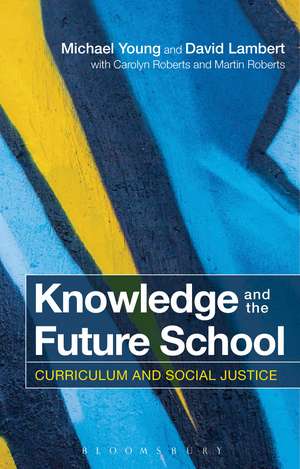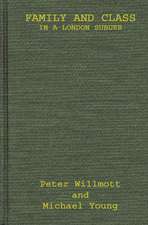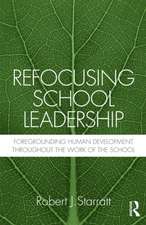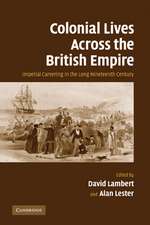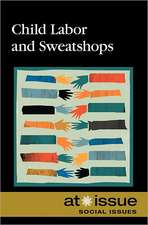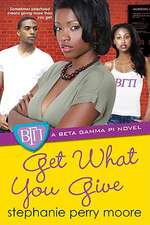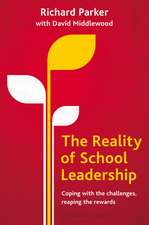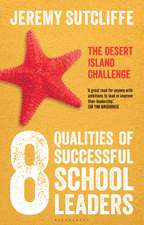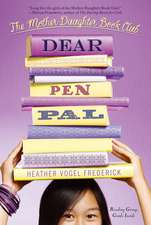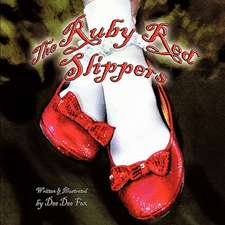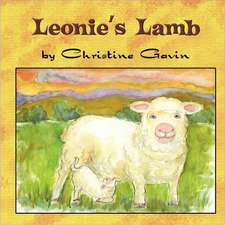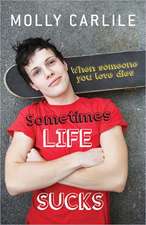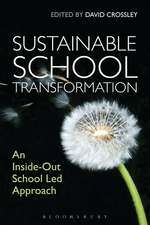Knowledge and the Future School: Curriculum and Social Justice
Autor Michael Young, David Lambert, Carolyn Roberts, Martin Robertsen Limba Engleză Paperback – 24 sep 2014
| Toate formatele și edițiile | Preț | Express |
|---|---|---|
| Paperback (1) | 184.46 lei 3-5 săpt. | +54.96 lei 4-10 zile |
| Bloomsbury Publishing – 24 sep 2014 | 184.46 lei 3-5 săpt. | +54.96 lei 4-10 zile |
| Hardback (1) | 567.99 lei 6-8 săpt. | |
| Bloomsbury Publishing – 24 sep 2014 | 567.99 lei 6-8 săpt. |
Preț: 184.46 lei
Preț vechi: 227.43 lei
-19% Nou
Puncte Express: 277
Preț estimativ în valută:
35.30€ • 36.65$ • 29.43£
35.30€ • 36.65$ • 29.43£
Carte disponibilă
Livrare economică 04-18 martie
Livrare express 15-21 februarie pentru 64.95 lei
Preluare comenzi: 021 569.72.76
Specificații
ISBN-13: 9781472528148
ISBN-10: 147252814X
Pagini: 248
Dimensiuni: 138 x 216 x 15 mm
Greutate: 0.31 kg
Ediția:New.
Editura: Bloomsbury Publishing
Colecția Bloomsbury Academic
Locul publicării:London, United Kingdom
ISBN-10: 147252814X
Pagini: 248
Dimensiuni: 138 x 216 x 15 mm
Greutate: 0.31 kg
Ediția:New.
Editura: Bloomsbury Publishing
Colecția Bloomsbury Academic
Locul publicării:London, United Kingdom
Caracteristici
Co-authored by Michael Young, a leading sociologist of education, and David Lambert, a leading geographer
Notă biografică
Michael Young is Emeritus Professor at IOE, UCL's Faculty of Education and Society, University College London, UK. His recent books include Knowledge, Expertise and the Professions (edited with Johan Muller, 2014), Implementing National Qualification Frameworks (edited with Stephanie Allais, 2013) and Bringing Knowledge Back In (2008).David Lambert is Professor of Geography Education in the Department of Curriculum, Pedagogy and Assessment at IOE, UCL's Faculty of Education and Society, University College London, UK. He is former Chief Executive of the Geographical Association, UK.Carolyn Roberts is Head Teacher, Thomas Tallis School, UK.Martin Roberts is Consultant to The Prince's Teaching Institute and former Head Teacher, The Cherwell School, UK.
Cuprins
Preface: Why should you read this book? Martin Roberts (The Prince's Teaching Institute, UK) and Carolyn Roberts (Thomas Tallis School, UK)Introduction, Michael Young (Institute of Education, UK) and David Lambert (Institute of Education, UK), Carolyn Roberts (Prince's Teaching Trust, UK) and Martin Roberts (The Prince's Teaching Institute, UK)1. Knowledge, curriculum and the future school, Michael Young (Institute of Education, UK)2. Why curriculum? Michael Young (Institute of Education, UK)3. Powerful Knowledge as a curriculum principle, Michael Young (Institute of Education, UK)4. The progressive case for a subject-based curriculum Michael Young (Institute of Education, UK)5. Curriculum change and control: a Headteacher's perspective, Martin Roberts (The Prince's Teaching Institute, UK)6. Curriculum leadership and the knowledge-led school, Carolyn Roberts (Thomas Tallis School, UK)6. Subject teachers in knowledge-led schools, David Lambert (Institute of Education, UK)7. Afterword, Michael Young (Institute of Education, UK), David Lambert (Institute of Education, UK), Carolyn Roberts (Thomas Tallis School, UK) and Martin Roberts (The Prince's Teaching Institute, UK)BibliographyIndex
Recenzii
[H]ighly accessible and jargon free ... [There is] much more to debate here than is possible in a brief review of this kind. My advice would be: buy the book and join the dialogue.
The authors manage to avoid the boring old binary distinctions that tend to characterise debates about education and the purpose of teaching: and in doing so, promote a practical vision for the 'future school' that places the curriculum at its heart ... An engaging reminder of the need to avoid easy solutions, and to keep thinking.
Rather than simply critiquing recent educational reforms, the authors of this book offer school leaders and teachers a clear and practicable way of thinking about knowledge and the curriculum. This way of thinking affirmatively links pupils' entitlement to knowledge with social justice through the development of knowledge-led schools and curricula. After nearly three decades of reform aimed at de-professionalizing educators, this book ultimately makes an urgent and persuasive case for their re-professionalization in the name of providing pupils with more equitable access to powerful knowledge.
I thoroughly recommend this book. It is carefully argued, thought-provoking and timely. Surely we can now move away from the often sterile and simplistic debates, "knowledge versus skills". Knowledge and the Future School presents us with a tantalizing alternative that will allow us to embrace the goal of widening access to 'powerful knowledge' through teaching framed by subjects, while at the same time celebrating the diverse experiences of students.
This book raises important questions about the place of knowledge in education and society. Whether you agree with all the answers or not, any serious minded educator or researcher with an interest in social justice, should pay careful attention to the arguments that Young and his collaborators are making.
You don't need to agree with every argument in this highly engaging book to appreciate the importance of its challenges. Let's think about what schools are actually for. Let's stop seeing their important work only in terms of data, targets, what can be measured. Here are some serious (but far from dull) arguments about knowledge and the work of schools. This book cuts across the usual political debates and point-scoring. It is a model of how to write well for an audience that should include teachers and head teachers, parents, the public - and politicians.
This is the book that many secondary school heads of department, frustrated by a focus on the pedagogic 'how?' at the expense of the disciplinary 'what?', have long been wanting their senior leaders to read. The authors' message is bold and its implication clear: disciplinary knowledge and curriculum thinking must become nothing less than the central concern of leadership, the essence of staff development and the driver of whole-school debate.
Knowledge and the Future School is an intelligent and courageous book that takes the reader to the very heart of what a good education in our schools should be. The authors have adeptly argued the case for a subject-led curriculum that not only enlightens, stretches and challenges the pupil but also brings joy in learning and teaching. Here teachers are given back the freedom to be 'sage' and 'guide' in their classroom as they reflect how best to enthuse a deep understanding of their subject. This approach puts the teacher as the academic professional in the classroom who not only helps his students to develop higher order thinking skills through the discipline of his subject but also gives permission for the teacher to deepen his own knowledge and understanding by working and learning with other professionals from school and universities within his discipline.The clarity of the message of this book cannot be mistaken. All children no matter their class or level of deprivation have a legitimate entitlement to powerful knowledge that is found in a subject led curriculum. This book is not about a traditional curriculum of the past which is rigid and requires just rote learning. Nor does it allow inequalities where pupils with less means are 'fobbed off' with a third class curriculum based on pupils' own experience giving them no real choices for their future. This book sets a demanding environment of a subject based curriculum that is not afraid to state knowledge is power led by a reflective practitioner who invests in both his pupils and his own understanding of the subject. This is a most liberating book that leaders in education, politicians and head teachers ignore at their children's peril.
This will not be an uncontroversial book - certainly not amongst politicians of either left or right. It is an important one, however. For passionate teachers everywhere, drawn into teaching by their love of their subject and the emancipatory power of education, it will be one which re-inspires them to think more deeply about what should be taught in their classrooms. The challenge to teach 'powerful knowledge', which liberates the mind and gives young people the ability to engage critically with the world will resonate deeply with teachers whose intrinsic motivations have always been to educate without dogma. This book's proposed 'Future 3' model will help teachers to transcend the sterility of the current ideological debate and fashion a future for their schools and pupils where deep educational values can take centre stage.
The authors manage to avoid the boring old binary distinctions that tend to characterise debates about education and the purpose of teaching: and in doing so, promote a practical vision for the 'future school' that places the curriculum at its heart ... An engaging reminder of the need to avoid easy solutions, and to keep thinking.
Rather than simply critiquing recent educational reforms, the authors of this book offer school leaders and teachers a clear and practicable way of thinking about knowledge and the curriculum. This way of thinking affirmatively links pupils' entitlement to knowledge with social justice through the development of knowledge-led schools and curricula. After nearly three decades of reform aimed at de-professionalizing educators, this book ultimately makes an urgent and persuasive case for their re-professionalization in the name of providing pupils with more equitable access to powerful knowledge.
I thoroughly recommend this book. It is carefully argued, thought-provoking and timely. Surely we can now move away from the often sterile and simplistic debates, "knowledge versus skills". Knowledge and the Future School presents us with a tantalizing alternative that will allow us to embrace the goal of widening access to 'powerful knowledge' through teaching framed by subjects, while at the same time celebrating the diverse experiences of students.
This book raises important questions about the place of knowledge in education and society. Whether you agree with all the answers or not, any serious minded educator or researcher with an interest in social justice, should pay careful attention to the arguments that Young and his collaborators are making.
You don't need to agree with every argument in this highly engaging book to appreciate the importance of its challenges. Let's think about what schools are actually for. Let's stop seeing their important work only in terms of data, targets, what can be measured. Here are some serious (but far from dull) arguments about knowledge and the work of schools. This book cuts across the usual political debates and point-scoring. It is a model of how to write well for an audience that should include teachers and head teachers, parents, the public - and politicians.
This is the book that many secondary school heads of department, frustrated by a focus on the pedagogic 'how?' at the expense of the disciplinary 'what?', have long been wanting their senior leaders to read. The authors' message is bold and its implication clear: disciplinary knowledge and curriculum thinking must become nothing less than the central concern of leadership, the essence of staff development and the driver of whole-school debate.
Knowledge and the Future School is an intelligent and courageous book that takes the reader to the very heart of what a good education in our schools should be. The authors have adeptly argued the case for a subject-led curriculum that not only enlightens, stretches and challenges the pupil but also brings joy in learning and teaching. Here teachers are given back the freedom to be 'sage' and 'guide' in their classroom as they reflect how best to enthuse a deep understanding of their subject. This approach puts the teacher as the academic professional in the classroom who not only helps his students to develop higher order thinking skills through the discipline of his subject but also gives permission for the teacher to deepen his own knowledge and understanding by working and learning with other professionals from school and universities within his discipline.The clarity of the message of this book cannot be mistaken. All children no matter their class or level of deprivation have a legitimate entitlement to powerful knowledge that is found in a subject led curriculum. This book is not about a traditional curriculum of the past which is rigid and requires just rote learning. Nor does it allow inequalities where pupils with less means are 'fobbed off' with a third class curriculum based on pupils' own experience giving them no real choices for their future. This book sets a demanding environment of a subject based curriculum that is not afraid to state knowledge is power led by a reflective practitioner who invests in both his pupils and his own understanding of the subject. This is a most liberating book that leaders in education, politicians and head teachers ignore at their children's peril.
This will not be an uncontroversial book - certainly not amongst politicians of either left or right. It is an important one, however. For passionate teachers everywhere, drawn into teaching by their love of their subject and the emancipatory power of education, it will be one which re-inspires them to think more deeply about what should be taught in their classrooms. The challenge to teach 'powerful knowledge', which liberates the mind and gives young people the ability to engage critically with the world will resonate deeply with teachers whose intrinsic motivations have always been to educate without dogma. This book's proposed 'Future 3' model will help teachers to transcend the sterility of the current ideological debate and fashion a future for their schools and pupils where deep educational values can take centre stage.
